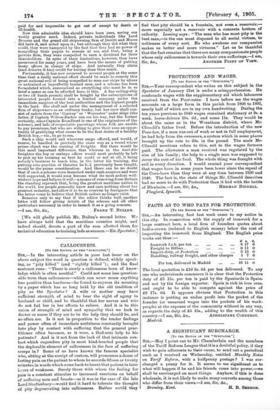(To THE EDITOR OP THE "HPBOTATOR."1 the interesting article in
your last issue on the above subject the word in question is defined, widely speak- ing, as " pity killed " (and " rightly killed ") ; and the final sentence runs : " There is surely a callousness born of know- ledge which is often needful." Could not some less question- able term than callousness—which can never mean anything less positive than hardness—be found to express its meaning by a paper which has so long held by the old tradition of pity as the Spectator ? A wife or mother may have sufficient strength of mind to bear the sight of agony in husband or child, and be thankful that her nerves and wits do not fail her in her efforts to relieve. And it is to this union of strength of mind and sympathy that we look in doctor or nurse if they are to be the help they should be, and so often are. Is it not in proportion to the tender feelings and power often of immediate usefulness constantly brought into play by contact with suffering that the general prac- titioner often becomes, as it were, a God-sent help to his patients P And is it not from the lack of that intimate con- tact which engenders pity in most kind-hearted people that the deplorable element of callousness in the face of suffering creeps in P Some of us have known the famous specialist who, sitting at the receipt of custom, will pronounce a doom of lasting pain on the patient to whom he accords fif teen or twenty minutes, in words which come back to haunt that patient in later hours of weakness. Surely those with whom the feeling for pain is a constant stimulus to increased exertions on behalf of suffering, men and beasts—as it was in the case of the late Lord Shaftesbury—would find it hard to tolerate the thought of pity degenerating into callousness. Rather wcvld they
feel that pity should be a fountain, not even a reservoir,— more especially not a reservoir with a concrete bottom of callosity. Leasing says : " The man who has most pity is the best man,—is the one most disposed to all social virtues, to nobleness of every sort. He who awakens our compassion makes us better and more virtuous." Let us be thankful that the fact remains that there are many compassionate people whose only callousness is towards their own sufferings.—I am, Sir, &c., ANOTHER POINT OF VIEW.










































 Previous page
Previous page